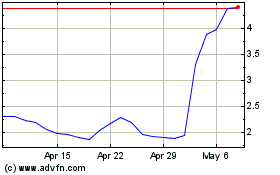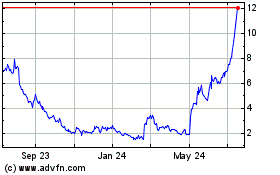By Peter Loftus
A contract manufacturing plant that is supposed to help make
Johnson & Johnson's Covid-19 vaccine didn't keep clean,
sanitary conditions and failed to take proper steps to prevent
contamination, federal health regulators said Wednesday.
Among the problems identified during the regulators' inspection
of the plant: cross-contamination of two different vaccines in
production at the plant. Their names were redacted, but people
familiar with the matter have said they are the Covid-19 vaccines
from J&J and from AstraZeneca PLC.
The U.S. Food and Drug Administration, which inspected the plant
owned by contract manufacturer Emergent BioSolutions Inc., said it
completed the inspection on Tuesday and would work with Emergent to
address the findings from the inspection.
Production of J&J's vaccine at the Emergent plant has been
paused, and material already manufactured will undergo additional
testing before it is released for potential distribution, the FDA
said.
"We will not allow the release of any product until we feel
confident that it meets our expectations for quality," said FDA
Acting Commissioner Janet Woodcock and Peter Marks, who heads the
FDA department overseeing vaccines.
The Emergent plant recently had a contamination-related mishap
that ruined a batch of the main ingredient for J&J's Covid-19
vaccine. No doses were distributed from the failed batch, and the
FDA hasn't authorized doses using material from the Emergent plant
to be distributed.
The mishap led to J&J taking over responsibility for
producing its vaccine at the Emergent plant.
Emergent, of Gaithersburg, Md., said it is working with the FDA
and J&J to quickly resolve the issues identified.
"While we are never satisfied to see shortcomings in our
manufacturing facilities or process, they are correctable and we
will take swift action to remedy them," the company said.
J&J, of New Brunswick, N.J., said it will ensure that all of
the FDA's inspection findings are addressed promptly and
comprehensively. The company said it is trying to secure FDA
authorization for making the main ingredient at the Emergent plant
as quickly as possible.
The doses of J&J's vaccine that have been distributed in the
U.S. contain drug substance manufactured at J&J's own plant in
the Netherlands.
The FDA's inspection of the Emergent plant is unrelated to the
agency's probe of serious blood-clot conditions seen in a handful
of people after they received the J&J Covid-19 vaccine.
Vaccinations with J&J's shot have been paused in the U.S.
while health authorities investigate the blood-clotting issue.
FDA inspectors conducted their inspection at Emergent's
Baltimore plant from April 12 through April 20.
At the conclusion of the inspection, they issued a Form 483,
which is a summary of findings that a plant didn't meet quality
standards. The FDA expects drug companies to fix issues identified
in a Form 483.
Their 13-page inspection report, which is partially redacted,
outlines numerous lapses in meeting quality standards at the
plant.
The FDA cited cross-contamination of a batch of one viral
vaccine with material used for a second viral vaccine, which the
agency said Emergent failed to prevent and properly
investigate.
The names of the two vaccines involved are redacted in the
report, but people familiar with the matter have said the
cross-contamination was between materials used for the Covid-19
vaccines from J&J and from AstraZeneca and its partner the
University of Oxford.
The AstraZeneca-Oxford vaccine hasn't been authorized for use in
the U.S., while J&J's shot was cleared in late February.
Production of the AstraZeneca vaccine at the Emergent plant has
been stopped and is being moved elsewhere.
The FDA inspection report said that a worker who dispensed raw
materials for one of the vaccines entered separate areas of the
plant where the two vaccines were being made. Emergent didn't
properly investigate personnel movements around the plant as a
potential source of the contamination, the report said.
The report says Emergent didn't maintain the plant "in a clean
and sanitary condition." Waste generated during the manufacture of
the two vaccines wasn't decontaminated using qualified methods, and
the waste was transported through a warehouse in a way that created
the potential to contaminate the warehouse, the report said.
FDA inspectors also found peeling paint on the floors and walls,
paint flecks on the floor, and rough surfaces that don't allow for
adequate cleaning and sanitation.
The FDA inspectors viewed security-camera footage at the plant
and spotted several instances of workers failing to prevent
cross-contamination. In January and early February, workers threw
unsealed bags of special medical waste into a service elevator, and
when carrying the bags they came into contact with containers of
manufacturing materials, the FDA report said.
Workers also failed to adhere to proper procedures for wearing
sterile gowns and other steps meant to avoid contamination, the
report said.
Write to Peter Loftus at peter.loftus@wsj.com
(END) Dow Jones Newswires
April 21, 2021 11:26 ET (15:26 GMT)
Copyright (c) 2021 Dow Jones & Company, Inc.
Emergent Biosolutions (NYSE:EBS)
Historical Stock Chart
From Mar 2024 to Apr 2024

Emergent Biosolutions (NYSE:EBS)
Historical Stock Chart
From Apr 2023 to Apr 2024
